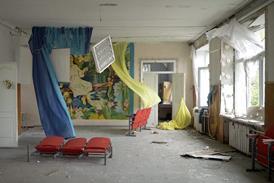Dir: Jose Padilha. Brazil. 2009. 110mins.

Jose Padilha’s raw documentary about life on the bread line makes for harrowing viewing. Shot in grainy black and white, the film relentlessly drives home the poverty and starvation that almost one billion people around the world have to live with. Festivals will respond and cable TV might be interested but theatrical potential is remote for this film about a subject most people don’t want to be reminded of.
Padilha’s new film is a far less commercial proposition than his controversial Elite Squad which won the Golden Bear at Berlin last year. He and his crew spent a whole month sharing the lives of three families living in various Brazilian locations, from the slums of the big city to remote countryside. The images he brought home not only bear the stamp of his own indignation at what he has seen but also show that no matter where the poor live, their experiences are always the same.
They drink and smoke away what little money they have, and whether or not they get state assistance, they cannot afford to feed themselves on anything more than beans and rice. The men do not work and withscant knowledge offamily planningthe women give birth to children who end up sitting on the floor scratching their scabies boils. All subscribe to the belief that whatever happens, God is there to provide the barest needs. The title refers to a mixture of water and sugar, a cheap high calorie substitute for solid food which the families feed to their children when they’re short of money.
Poverty and malnutrition and its associate miseries of slum housing, bad sanitation and hygiene, swollen bellies, rotten teeth and apathy and indolence are portrayed in grim detail. There’s not a shred of hope that these conditions might get better. With his inquisitive camera and remarkable direct sound quality, Padilha is nothing if not persistent, showing again and again the same scenes of deprivation whose emotional impact, he seems to believe, will be enhanced with every repetition. There’s a real risk of overkill here, however, and Padilha doesn’t attempt to put the phenomenon in a larger context or to explain the reasons that cause such deprivation. It’s shocking, appalling and unacceptable, but how to eradicate it is not a question he answers.
Production company/international sales
Zazen Producoes (55) 21 25128022
Producers
Jose Padilha
Marcos Prado
Executive producers
James D’Arcy
Mariana Bentes
Screenplay
Felipe Lacerda
Jose Padilha
Cinematography
Marcela Bourseau
Editor
Felipe Lacerda





















No comments yet